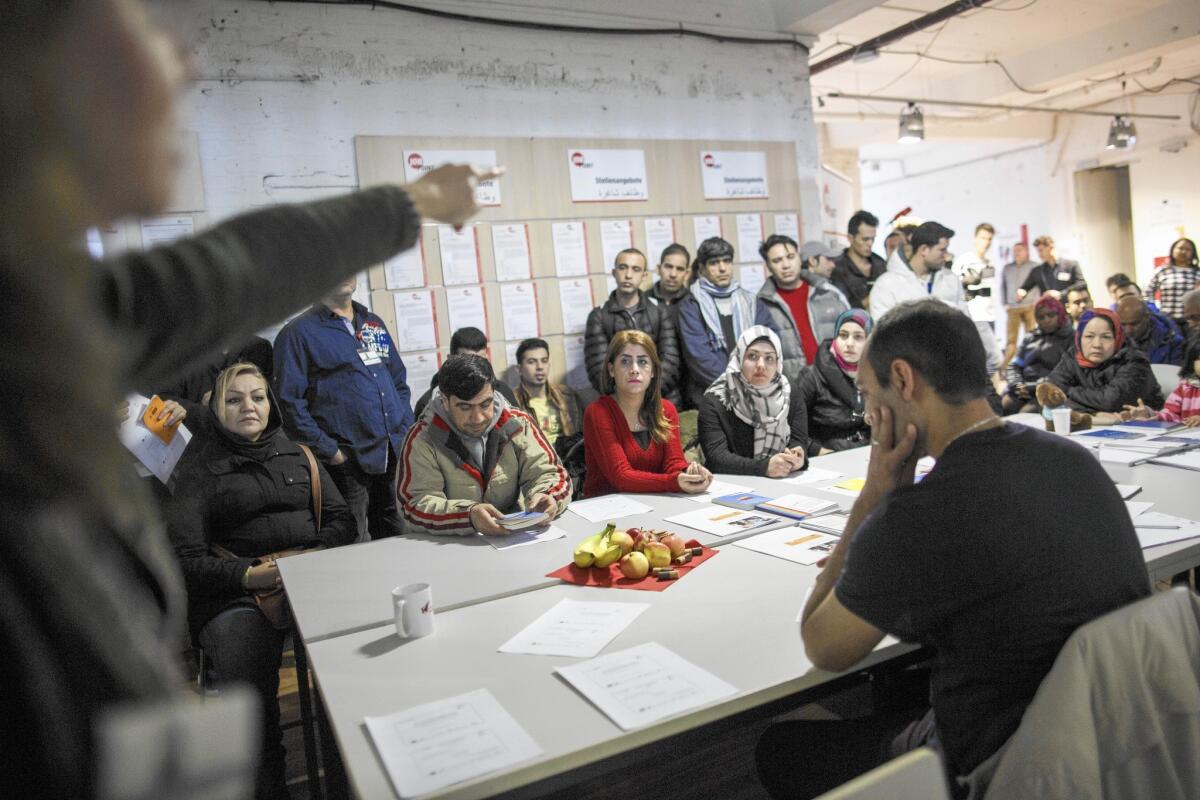Refugees buying one-way tickets home after finding Germany intolerable

Refugees from different countries attend an information session in Berlin in late February.
With a one-way ticket home to Iraq in his hands and seven months’ worth of frustration over intransigent German bureaucracy in his heart, Gazwan Abdulhasen Abdulla gave up on his dreams of a better life in Europe.
Homesick and eager to be back with his wife and four small children in Basra, Abdulla was giving up his refugee status as he boarded a crowded Iraqi Airways flight from Berlin’s Tegel Airport to Baghdad that would whisk him and 150 other disillusioned former refugees back home in five hours.
He had scraped together his last $325 for the flight to Iraq — a small fraction of the money he had paid to smugglers last summer to get to Germany by foot, bus and boat through Turkey, Greece, the Balkans and Austria.
But now, after more than 1.1 million refugees from troubled lands such as Syria, Iraq and Afghanistan have trekked into Germany over the last 13 months, a small but growing number are heading home.
The reasons are myriad, but include overcrowded refugee centers, exasperating bureaucracy, unfamiliar German food, a lack of jobs and a spreading sense of resentment from Germans who fear their country is being overrun by Muslims.
Many refugees say they are now happy to trade a cold, heartless and lonely life in one of Europe’s richest countries for the violence, insecurity and poverty back home. And they say they have realized, rather belatedly, that smugglers had sold them a pack of lies about big houses, well-paying jobs and the life of luxury they would find in Germany.
“I wanted to live in peace with my family as far away from war as possible,” said Abdulla, a 37-year-old who had worked as a truck driver in Iraq. “But what I’ve seen in Europe is not what I dreamed about. It’s not what [the smugglers] told me it would be.
Join the conversation on Facebook >>
“The food was terrible, so disgusting that not even animals should be fed it. They made us sleep in these cold, empty buildings and when someone said they were sick, they just ignored us. You could feel it everywhere that Germans looked down at us like we were bums. I miss my family and can’t wait to get home.”
Abdulla, like many of the refugees, had come to Germany on his own and figured his family could follow. But the German government, fearful that the number of refugees could increase fourfold if families were reunited, temporarily suspended the rules last year that allowed refugees to send for their family members.
Now it could take two to five years or more before their families might be allowed to move to Germany — an intolerable wait that is one of the main reasons that hundreds, perhaps thousands, of refugees are giving up on Germany every week, even as up to 3,000 arrive every day.
The Iraqi Embassy in Berlin has issued more than 1,500 one-way travel documents for Iraqi refugees giving up on Germany in the last three months.
“There are a lot of Iraqis going home, but more and more Syrians are also coming in here to buy airplane tickets to fly back home,” said Alaa Hadrous, 24, who came to Germany from Iraq as a child and now operates the Golf Reisen travel office next to a refugee center in the heart of Berlin.
“They see the Arabic writing on my storefront window and come in saying they want to go home,” he said. “There are a lot of really sad stories.”
NEWSLETTER: Get the day’s top headlines from Times Editor Davan Maharaj >>
Hadrous sees masses of exhausted refugees camped on the street in front of his shop at night — new arrivals who are sometimes forced to wait overnight for their asylum applications to be processed so that they can go to a shelter.
“It’s really upsetting to me whenever I see little children outside freezing in the cold,” he said, adding that he has often ended up sheltering such shivering families with small children in his small apartment nearby for the night. He said he noticed an increase late last year in the number of refugees coming to him for one-way tickets home.
“They started coming into my store,” he said. “They’ve given up on Germany, even though some have only been here for a few weeks. They had the wrong idea and wrong expectations about Germany. People in Iraq told them they could live a carefree life in Germany.”
A Syrian man, who gave only his first name, Abed, had just bought a one-way ticket to Lebanon after spending four weeks in Germany. He said life on his own in Germany was a lot harder than he expected and it was depressing when he found out his wife and daughter weren’t allowed to join him.
“I miss my family a lot,” he said. “I’d rather take a chance and risk dying with them in Syria than being in Germany without them.”
The government’s office for migration and refugees reported that 37,220 refugees obtained government financial aid to return to their home countries in 2015. Most of those were from countries in the Balkans and had little chance of being granted asylum. Only 724 of about 122,000 refugees from Iraq went home last year with German government assistance.
The migration agency points out, however, that it doesn’t have a complete overview because many refugees pay for their own trips home.
“The numbers of refugees wanting to go home is growing every week — once they discover they can’t bring their families here, they give up on Germany,” said Ardalan Hassan, the head of the Dania Travel Agency in the Wedding district of Berlin.
“They thought they’d be warmly welcomed in Germany,” he said. “Some thought they’d get a lot of money, that the state would give them big houses to live in.... It’s only after they get here that they see how poor their prospects to earn a living are.”
Hassan said that he tries to tell Iraqis to stay home in the first place, that life in Germany isn’t as easy as they think. “But no one believes me,” he said. “They have to see it themselves to believe how difficult it is here.”
The increase in the number of refugees returning home could offer some unexpected relief to Chancellor Angela Merkel, who has come under attack for her open-door policies.
Merkel has also subtly changed her message to the refugees from one of welcome in September 2015 — her immortal words of “We can do it” — to a more standoffish view in February.
“We expect that you’ll go back to Syria once there’s peace there and Islamic State has been defeated,” Merkel said. “We expect you’ll go back to your homes.”
That might not be as far-fetched as it sounds. Germany allowed in 350,000 refugees from the Balkan wars in the early 1990s. By 1998, after the wars had ended, about 70% had returned, voluntarily or otherwise, to Serbia, Bosnia-Herzegovina, Croatia, Kosovo, Albania and Slovenia.
Ahmed, a 24-year-old from Irbil, Iraq, came to Germany hoping to study engineering. But after eight months waiting in vain for his asylum request to be processed, he gave up and flew home in mid-February.
“We came here to Germany to live free but we’re not free here,” he said before he left. “We’ve got more freedom at home in Iraq than here.... I’m tired of being treated like an animal, of living in a giant room with hundreds of others and getting horrible food and having to take cold showers. I can’t wait to get home.”
Kirschbaum is a special correspondent.
ALSO
Pentagon wages cyberwar against Islamic State
This Oscar-winning movie has Pakistan vowing to protect women against ‘honor killings’
Why Trump and Sanders are praising healthcare in other countries
More to Read
Start your day right
Sign up for Essential California for news, features and recommendations from the L.A. Times and beyond in your inbox six days a week.
You may occasionally receive promotional content from the Los Angeles Times.






